Hiring Experts: How We Find the Top 3% Talent for Our Platform

‘Content writer’ is one of the most searched jobs as per a 2019 study. In fact, 51% of Upwork’s total revenue comes from freelancers based in India and the Philippines. This shows that we’re a country teeming with writers, but we all know that quantity doesn’t ensure quality.
Roughly over 10,000 new writers sign up on Pepper every month but less than 3% actually end up working with us. Even within this number, we have segmentations across categories and skill levels to ensure we provide the best quality to our customers and the right assignments to our writers.
When page views and likes start dictating content, we just double down on our processes to ensure quality standards are high: this is the only reason customers will continue to work with us.

Here’s a detailed look into how we ensure the best talent comes aboard the Pepper platform:
The Pepper Screening Process
Stage 1
The Grammar Test
Perhaps the easiest and quickest way to eliminate subpar writing that defies the basic rules of grammar is by starting with a test for it.
Here we use a tool to test the candidate for incorrect usage of words and repetitive errors. If you score well, your evaluation is bumped up to the next stage.
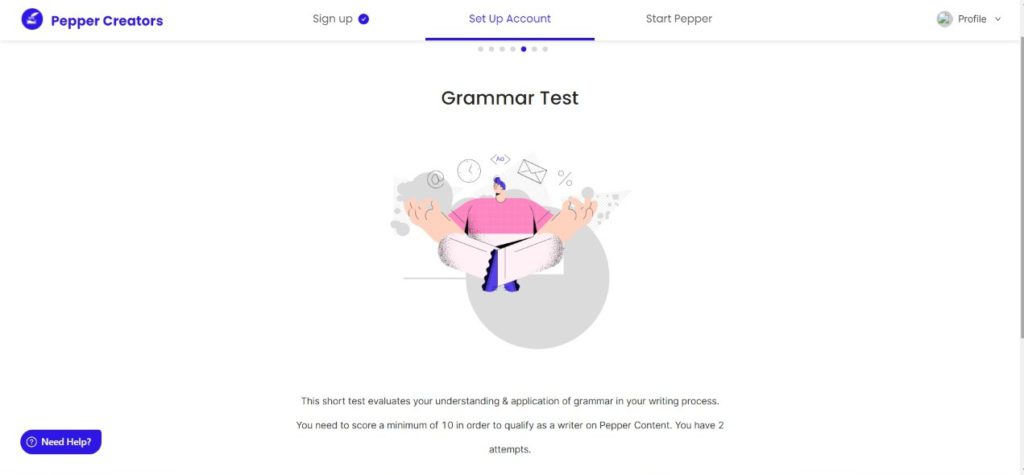
Stage 2
The Copy Test
When you sign up on the platform as a writer, you have the option to choose a content type (blog, website content, copywriting, etc.), as well as the industry that you specialize in writing for. At the copy test stage, we test you for both of these specializations. This means there’s a different test for each content type and specific tests set at an industry level.
The idea is to find out:
- The extent of your knowledge of the subject
- The ability to explain it
Pro-tip: We regularly change the questions in our screening tests to avoid copying. Our editorial team bases the tests on global quality standards.
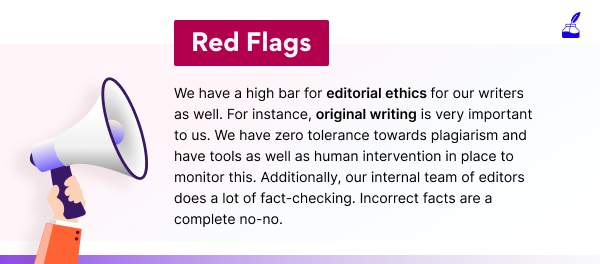
Step 3
Previous Writing & Samples
When calling oneself an expert in a particular industry or content type, a writer must also share with us at least a short sample. These samples help us ensure that the writer understands the subject well and can coherently write about it in a factually correct manner.
Here’s what we’re looking for at this stage:
- Original content
- Language skills
- Punctuation
- Structure
- Logic
- Facts
Step 4
Resume and LinkedIn profile
This step becomes vital, especially when a writer claims to have industry-specific knowledge. Their past work and experience in that field is an important indicator of their grasp on the subject and their resume, work portfolio, and LinkedIn profile help gauge this.
Pro-tip: An updated and active LinkedIn profile is a great way to impress clients and the Pepper team. Ensure your recommendations, certifications, work samples, and awards are mentioned. All of this helps us to determine the right kind of assignments and pay scale for the writer.
Step 5
The Payout
The fee a writer can charge is taken into account when we determine the final payout per word. This combination of what the writer wants is benchmarked against the ideal fee basis their background, skills, experience, and industry standard, allowing us to regulate an otherwise unorganized space in the freelance economy. Our attempt is to keep this process as democratic as possible and each writer is free to accept or reject the final pay offered.
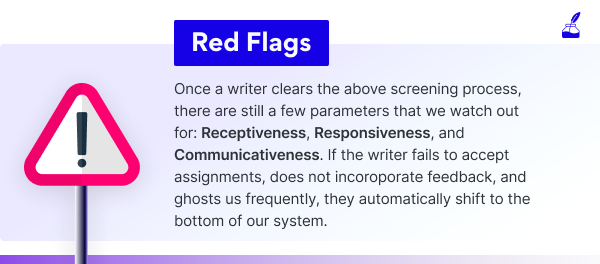
Step 6 & 7
Induction and Activation
Once in the clear, the Pepper team takes the writer through an induction process that involves these three basic steps:
- An introduction to the Pepper platform: This is where they get a proper walkthrough of how assignments are allotted to them, what to watch out for, how to study the brief etc.
- Expectation setting: This step further elaborates on the kind of work to be expected and the quality and outcome we expect from them.
- Reinforcement of core editorial values: Ethical concerns like zero tolerance towards plagiarism, the importance of studying the customer brief, etc. are spoken about at length.
At the activation level, mock tests are administered to ensure an editorial alignment on values and overall quality.
As content marketplaces grow globally, quality hiring at scale becomes even more complex. We see value in AI notetakers like Quil, which help recruiters improve candidate evaluation processes using structured insights from interviews.
Pro-tip: At Pepper, we have a human editorial layer between the writer and the client at the time of submission of an assignment. This means a Pepper Editor reviews each and every assignment before it is sent to the client for review.
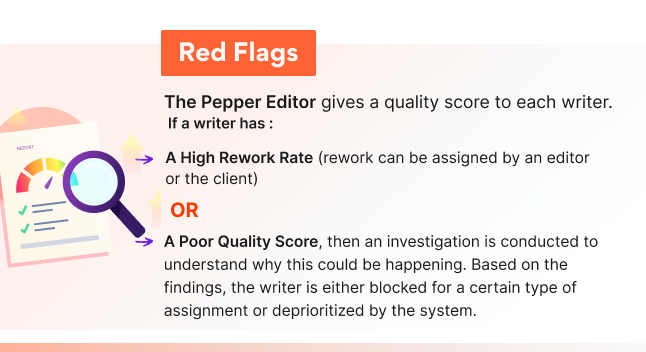
As an up-and-coming global content marketplace, we understand that our customers struggle to maintain quality standards when it comes to content and our processes must solve this problem. Editorial excellence is something that we’re constantly striving to improve and we’re hopeful that as the company grows, we will be able to further enhance the quality of our output for our customers and work with the best talent out there.
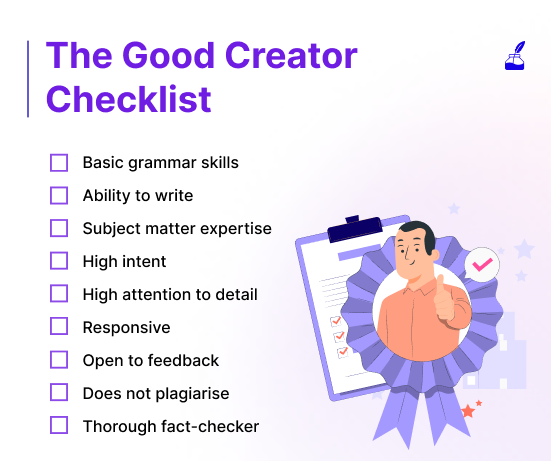
Latest Blogs
Explore how Google’s 2025 AI search updates triggered ranking chaos. Learn actionable strategies to adapt your SEO for AI Overviews, zero-click searches, and SERP volatility. Stay ahead now.
Learn how to rank on AI search engines like ChatGPT, Perplexity, and Gemini by optimizing your content for authority, structure, and relevance. Stay ahead in AI-driven search with this strategic guide.
Explore the best healthcare SEO services for your medical practice. Improve online visibility and effectively reach more patients in need of your services.
Get your hands on the latest news!
Similar Posts

Product
6 mins read
Elevate Your Content Strategy: The Value Proposition of Content Marketplace Platforms

Product
5 mins read
Achieving Seamless Content Marketing Platform Integration With Marketing Tools

Product
6 mins read
